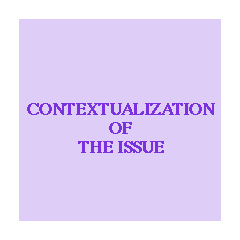No 20. Fevrier 2002.
https://www.arts.uwa.edu.au/MotsPluriels/MP2002edito2.html
© Alexie Tcheuyap
Alexie Tcheuyap
University of Calgary
|
|

Arising out of the many mirages it constructs and the cunning ideological standardization it spreads, "globalization" also manifests itself in the mobilization/mobility of people, who are more and more often reduced to just an item of capital, an asset whose productivity and profitability must not on any account be brought into question. With the human having become simple materiality, surprising and no less contradictory changes are now being forced upon the sociology of employment: we are witnessing a certain tolerance of the Other in countries where segregation and even xenophobia used to be the rule. The presence of the Black person is becoming more significant, even where the user was not expecting to encounter him, because the employers of the North have, out of economic necessity, been forced to accept or resign themselves to the idea of broadening the areas within which they carry out recruitment.[1]
The positive aspects of the half-open door, which allows some Africans to find a job in the "paradise of the North", do not count for much, however, in comparison with the frustrations of thousands of other people for whom the West has become a real nightmare. After emigration to some other place which it is hoped will be better, the degrees that have been attained after a great deal of hard work often lose their value and lead less often to success than to alcoholism, all sorts of trafficking, dusty subways, filthy water in restaurants, worn-out taxi seats or the blood of industrial abattoirs. While as the graduate has to accept an occupation that he had never imagined, even in his worst nightmares, the degree mentioned in his CV is of no further use, but he has to survive!
The fact that the educational level of African immigrants is very high (more than 80% of African immigrants in Montreal had undertaken university studies[2]) does not mean that the host country is going to use their skills advisedly. Whilst the North and Big Capital need brains, they also need a labour force to exploit and their choices are often made without taking individuals’ aspirations, training or intellectual potential into account. Similarly, globalization does not take any greater consideration of the interest and development of the countries of the South, which are still talliable and liable to forced labour at pleasure, just as they were in the time of slavery or in colonial times.
This mobilization/mobility, which suits the devastating economies of the North just as well as the corrupt regimes of the South, has yet to be evaluated and it seemed to us that we need to start thinking about it in depth. The ever more (re)marked presence of African graduates and executives in the countries of the North is the sign of a deep-seated uneasiness, in both the North and the South. More and more Africans are leaving, fewer and fewer are returning, and the cycle of the "Black student" or the "Negro in Paris" involved in an "ambiguous adventure" which will nevertheless bring him back to his "native land" has gone! For many of today’s African graduates, "leave" no longer goes with "return" but rather with "See the West and/or die (there)!" and it is a sign of the times that the African continent has become a provider of labour — often highly qualified — at a time when it has the greatest need of African brains of all types to serve in their countries of origin, most of which are completely bankrupt. Institutional jargon has even found a becoming expression to describe the phenomenon: Reverse Transfer of Technology. The articles in this edition of Mots Pluriels approach the issue of the brain drain from various perspectives: literary, sociological, anthropological and political. After suggesting a certain number of conceptual benchmarks, this collection examines the relationships between theory and practice and theorizes on the actual experience of African executive migration.
 In the first article,
In the first article,
![]() carries out some semantic fine-tuning on the concept of "brains" before tackling the various trends and the ideological presuppositions in the discourse on this subject. Guèye warns us against the essentialist, reductionist and liberticide nature of certain theoretical statements on the mobility of skilled Africans and suggests that expatriation does not bring the idea of belonging to Africa back into question. The positive role played by the formation of diasporic and "transnational" networks analyzed by
carries out some semantic fine-tuning on the concept of "brains" before tackling the various trends and the ideological presuppositions in the discourse on this subject. Guèye warns us against the essentialist, reductionist and liberticide nature of certain theoretical statements on the mobility of skilled Africans and suggests that expatriation does not bring the idea of belonging to Africa back into question. The positive role played by the formation of diasporic and "transnational" networks analyzed by
![]() proves this. His study shows the positive effects that the mobilization of expatriates can have for the socio-economic and political development of the African continent. However, as
proves this. His study shows the positive effects that the mobilization of expatriates can have for the socio-economic and political development of the African continent. However, as
![]() and
and
![]() point out, whilst some countries have managed to reap advantage from an acceleration in the rate at which their elites are leaving for the industrialized countries, it is far from sure that this "brain drain" will systematically be a "brain gain" in the long term. Despite the neo-liberal rhetoric, the migration of highly qualified people to host countries still seems to be a handicap for countries whose elites are leaving. However, rather than blaming the current bankruptcy on a scapegoat — particularly those people who are leaving their countries of origin —
point out, whilst some countries have managed to reap advantage from an acceleration in the rate at which their elites are leaving for the industrialized countries, it is far from sure that this "brain drain" will systematically be a "brain gain" in the long term. Despite the neo-liberal rhetoric, the migration of highly qualified people to host countries still seems to be a handicap for countries whose elites are leaving. However, rather than blaming the current bankruptcy on a scapegoat — particularly those people who are leaving their countries of origin —
![]() suggests that it is time to move beyond the empirical and theoretical contradictions and tackle the effects of the brain drain in a unified, collective way so as to harness the learning of Africans, wherever they may be. A wonderful programme, unquestionably, but rather close to Utopia.
suggests that it is time to move beyond the empirical and theoretical contradictions and tackle the effects of the brain drain in a unified, collective way so as to harness the learning of Africans, wherever they may be. A wonderful programme, unquestionably, but rather close to Utopia.

![]() ’s incisive study testifies to this and comes from his long experience as a "drained brain". With the aberrations they create, African dictatorships do not recognize "brains" until they have escaped. Exile therefore becomes proof of recognition of the proficiency that has been denied and repudiated by authorities fearful of knowledge and truth. As he points out, this recognition is conferred only by society. Consequently, proficiency becomes a political stake. Returning is therefore often just as difficult as leaving and the article by
’s incisive study testifies to this and comes from his long experience as a "drained brain". With the aberrations they create, African dictatorships do not recognize "brains" until they have escaped. Exile therefore becomes proof of recognition of the proficiency that has been denied and repudiated by authorities fearful of knowledge and truth. As he points out, this recognition is conferred only by society. Consequently, proficiency becomes a political stake. Returning is therefore often just as difficult as leaving and the article by
![]() tolls like a judgment: There is no happy going back. For lots of reasons, tragedy lies in wait for executives who return to the fold and with the worsening of living conditions, the prospect of a "return to the country of one’s birth" is terrifying ; this to the point where one could wonder whether emigrating is not a misfortune.
Emigrate to the West, most certainly, but also, sometimes, to a
neighbouring country as
tolls like a judgment: There is no happy going back. For lots of reasons, tragedy lies in wait for executives who return to the fold and with the worsening of living conditions, the prospect of a "return to the country of one’s birth" is terrifying ; this to the point where one could wonder whether emigrating is not a misfortune.
Emigrate to the West, most certainly, but also, sometimes, to a
neighbouring country as
![]() shows in her creative piece
that stresses the "bad habits" picked up by Nigerians and other West
Africans when they settle in South Africa and adopt, in the author's
opinion, a machismo characteristic of many men on the subcontinent and certainly elsewhere as well.
shows in her creative piece
that stresses the "bad habits" picked up by Nigerians and other West
Africans when they settle in South Africa and adopt, in the author's
opinion, a machismo characteristic of many men on the subcontinent and certainly elsewhere as well.
Whilst the brain drain does indeed have an inter-African dimension, the elites’ departure for the countries of the North is of particular concern, hence the efforts being made in Africa itself to limit the disastrous effects. The case study by
![]() of the Ecole Inter-Etats des Sciences et Médecine Vétérinaires in Dakar picks up the role of the sub-regional institutions in the fight against the migration of skilled people on the basis of experience in the field. The author lists a series of concrete proposals that could allow migratory flows to be reversed or at the very least reduced. But for every positive example, how many countries still lag behind, paralyzed by globalization.
of the Ecole Inter-Etats des Sciences et Médecine Vétérinaires in Dakar picks up the role of the sub-regional institutions in the fight against the migration of skilled people on the basis of experience in the field. The author lists a series of concrete proposals that could allow migratory flows to be reversed or at the very least reduced. But for every positive example, how many countries still lag behind, paralyzed by globalization.
![]() lucidly considers the case of Cameroon, one of the countries that is noticeably visible in the West because of the number of expatriate executives and academics, but his conclusion could also illustrate lots of other countries: "In summary, despite being aware of the problem of the brain drain and the need to strengthen national capabilities with a view to lasting development, the African countries, and Cameroon in particular, have not yet taken the required action. This is especially true for the skills exodus problem, which has not yet raised the slightest concern". At issue here, as elsewhere, is the total absence of foresight, the lack of awareness, indeed the casualness of a government that is taking no serious action to stem the haemorrhage of the elites.
lucidly considers the case of Cameroon, one of the countries that is noticeably visible in the West because of the number of expatriate executives and academics, but his conclusion could also illustrate lots of other countries: "In summary, despite being aware of the problem of the brain drain and the need to strengthen national capabilities with a view to lasting development, the African countries, and Cameroon in particular, have not yet taken the required action. This is especially true for the skills exodus problem, which has not yet raised the slightest concern". At issue here, as elsewhere, is the total absence of foresight, the lack of awareness, indeed the casualness of a government that is taking no serious action to stem the haemorrhage of the elites.
For
![]() , the skills exodus will end only if Africa resolutely changes course and takes a certain number of steps: a change in political practice and culture, respect for individual and collective freedoms, an improvement in living and working conditions, joint and several commitment on the part of the African elites, and also a different attitude with regard to women because, she says, the perception of the social role of women in Africa has not changed a great deal and there is still a tendency to disregard and undervalue them in all sectors of life, whether economic, educational, artistic, social or political.
, the skills exodus will end only if Africa resolutely changes course and takes a certain number of steps: a change in political practice and culture, respect for individual and collective freedoms, an improvement in living and working conditions, joint and several commitment on the part of the African elites, and also a different attitude with regard to women because, she says, the perception of the social role of women in Africa has not changed a great deal and there is still a tendency to disregard and undervalue them in all sectors of life, whether economic, educational, artistic, social or political.
 From an "afrocentric", almost nationalistic perspective,
From an "afrocentric", almost nationalistic perspective,
![]() draws up a relevant and straightforward table of language on the identity and immigration of African intellectuals. Very useful and of unusual relevance, the typology he draws up allows each "public servant of the intellect" to see where he is located in the contemporary academic universe and better apprehend his relationship with the former "Master", its hegemonic value system, its clichés and its rhetoric. For the drama of the African intellectual seduced by empty glory, as we will see in the article by
draws up a relevant and straightforward table of language on the identity and immigration of African intellectuals. Very useful and of unusual relevance, the typology he draws up allows each "public servant of the intellect" to see where he is located in the contemporary academic universe and better apprehend his relationship with the former "Master", its hegemonic value system, its clichés and its rhetoric. For the drama of the African intellectual seduced by empty glory, as we will see in the article by
![]() dedicated to Léopold Panet, is his devotion to power and its values. The article by
dedicated to Léopold Panet, is his devotion to power and its values. The article by
![]() expresses a similar idea, without embellishments. Whilst the current presence of Africans in institutions bears witness to revenge against the racist theorists who made them into incompetents, it is still, in his view, a question of a "new slave trade". A trade that actually begun in Africa where black kinglets pitilessly hound the local academics, to whom they often prefer expatriates involved in "cooperation" and whose incompetence is sometimes scandalous.
expresses a similar idea, without embellishments. Whilst the current presence of Africans in institutions bears witness to revenge against the racist theorists who made them into incompetents, it is still, in his view, a question of a "new slave trade". A trade that actually begun in Africa where black kinglets pitilessly hound the local academics, to whom they often prefer expatriates involved in "cooperation" and whose incompetence is sometimes scandalous.
![]() explores the civic responsibilities of academics who decide to abandon their own countries in order to escape structural adjustments and victimization by corrupt petty tyrants and who find themselves, unhappily for them, in countries where immigration often proves to be easier than integration and professional success. The negative perception of Africa in the West and the ideology that dominates North-South relations weigh very heavily on the future of immigrants who are often shamelessly exploited.
explores the civic responsibilities of academics who decide to abandon their own countries in order to escape structural adjustments and victimization by corrupt petty tyrants and who find themselves, unhappily for them, in countries where immigration often proves to be easier than integration and professional success. The negative perception of Africa in the West and the ideology that dominates North-South relations weigh very heavily on the future of immigrants who are often shamelessly exploited.
To what degree will the generalization of new technologies allow these old gulfs to be transcended and a brake to be put on the brain drain by facilitating Africa’s access to the knowledge and information on which the West bases its development? It this desirable? It is too early to say, but
![]() stresses that, despite its modest successes in Africa, the Internet remains firmly anchored in the countries of the North and the question should be asked as to whether the limited efforts made by the Western countries to connect Africa to it have not been aimed mainly at creating new markets on which their products can be disposed. As revealed by
stresses that, despite its modest successes in Africa, the Internet remains firmly anchored in the countries of the North and the question should be asked as to whether the limited efforts made by the Western countries to connect Africa to it have not been aimed mainly at creating new markets on which their products can be disposed. As revealed by
![]() in an article focusing on Russia, cutting all bridges with the past and letting oneself be carried away by Western materialism do not offer any guarantee of success. Indeed, one can ignore only at one’s own risk and peril the triumphant march forward of all-conquering capitalism; but learning to come to terms with it does not mean submitting to it body and soul. Africa has too often been the victim of bogus knowledge from elsewhere and, as
in an article focusing on Russia, cutting all bridges with the past and letting oneself be carried away by Western materialism do not offer any guarantee of success. Indeed, one can ignore only at one’s own risk and peril the triumphant march forward of all-conquering capitalism; but learning to come to terms with it does not mean submitting to it body and soul. Africa has too often been the victim of bogus knowledge from elsewhere and, as
![]() suggests in his analysis of a piece of work by José Tshisungu wa Tshisungu, it is up to Africa itself to find a "domestic" solution by soaking up its own historic reality.
suggests in his analysis of a piece of work by José Tshisungu wa Tshisungu, it is up to Africa itself to find a "domestic" solution by soaking up its own historic reality.
As witnessed by the short story by
![]() and three interviews with African writers included in this collection, Africa is going through very difficult times. From their works and their respective experiences,
and three interviews with African writers included in this collection, Africa is going through very difficult times. From their works and their respective experiences,
![]() from the Congo,
from the Congo,
![]() from Ivory Coast and
from Ivory Coast and
![]() from Senegal (interviewed by Julie Van Dam) put forward a harsh indictment of those African potentates whose tragic gesticulations are driving their co-citizens to despair and are pushing them to flee the ambient poverty and offer their services elsewhere. In this difficult context, this issue of Mots Pluriels does not claim to offer any "key in hand" solutions like the ones that are often proposed in Africa by cooperative scheme workers and bilateral institutions. Beyond the ideological discussions, it will still be difficult to claim that the hemorrhage of skilled people is not a problem for Africa. Nor is it fate, however. It is the consequence of specific socio-historical facts. For as the Chinese researcher C.H.C. Kao said very appropriately with regard to his own country, "brains go where there are brains, brains go where there is money, brains go where humanity and justice prevail, brains go where acknowledgment and healthy competition are assured."[3] This idea can be transferred to Africa and it falls to various governments to take on their responsibilities, because the endemic exodus of African brains is a political issue.
from Senegal (interviewed by Julie Van Dam) put forward a harsh indictment of those African potentates whose tragic gesticulations are driving their co-citizens to despair and are pushing them to flee the ambient poverty and offer their services elsewhere. In this difficult context, this issue of Mots Pluriels does not claim to offer any "key in hand" solutions like the ones that are often proposed in Africa by cooperative scheme workers and bilateral institutions. Beyond the ideological discussions, it will still be difficult to claim that the hemorrhage of skilled people is not a problem for Africa. Nor is it fate, however. It is the consequence of specific socio-historical facts. For as the Chinese researcher C.H.C. Kao said very appropriately with regard to his own country, "brains go where there are brains, brains go where there is money, brains go where humanity and justice prevail, brains go where acknowledgment and healthy competition are assured."[3] This idea can be transferred to Africa and it falls to various governments to take on their responsibilities, because the endemic exodus of African brains is a political issue.
Notes
[1] See the "stategic ajustments" on the labour market imposed on Europe economies, in particular in France and Germany.
[2] Dorothy W. Williams, ´ Histoire résumée des noirs montréalais ª, in James L. Torczyner et al., L'Evolution de communauté noire montréalaise : mutations et défis, Montréal, CMEPSS, p.15.
[3] Cited by Anne-Marie Gaillard et Jacques Gaillard, Les enjeux des migrations scientifiques internationales. De la quête du savoir à la circulation des compétences, Paris, L'Harmattan, 1999, p.157.
 | Alexie Tcheuyap was educated at Moray House College of Education, Edinburgh; the Higher Teacher Training College (DIPES I & II), Yaoundé The University of Yaoundé, (BA Bilingual Studies, Maîtrise and Doctorat de 3ème Cycle in African literatures); and Queen's University,Kingston, Canada, (PhD in Francophone literatures and film theory). He has edited Littérature et Cinéma et Afrique francophone. Présence Francophone, no. 57, 2001, (with Sada Niang); authored Esthétique et folie dans l'oeuvre romanesque de Pius Ngandu Nkashama, (Paris/Montréal: L'Harmattan, 1998, 240p.); and articles in Protée, Research in African Literatures, CiNéMAS, Bulletin of Francophone Africa, Palabres, LittéRéalité and Mots Pluriels. He is Assistant Professor of Francophone literatures and films at the University of Calgary. Published online: Le moine habillé. Réflexes vestimentaires et mythologiques identitaires en Afrique, Mots Pluriels, 10, 1999. |
Back to [the top of the page] [the contents of this issue of MOTS PLURIELS]
